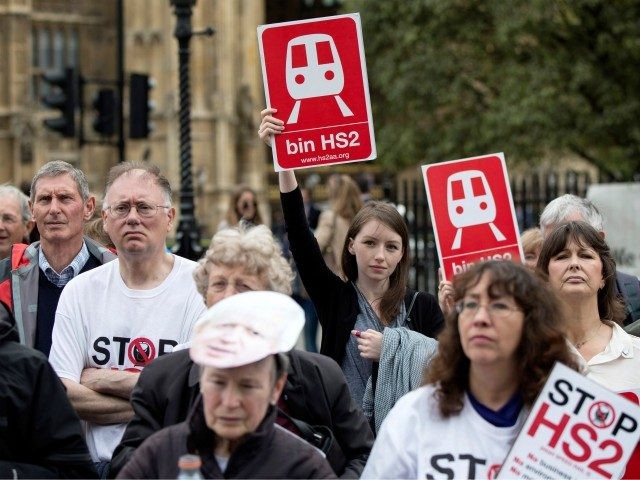Brexit Party leader Nigel Farage has criticised the government’s plans to proceed with the costly High Speed 2 (HS2) rail link despite the UK facing “the worst economic crisis for 300 years”, calling the decision “sheer madness”.
The Department for Transport announced on Wednesday that the government had approved the widely-unpopular HS2 high-speed network, which is projected to cost the British taxpayer more than £100 billion.
In the statement, the government said that the go-ahead “provides a vote of confidence in construction companies and the wider supply chain supporting HS2” at a time of economic uncertainty due to the coronavirus outbreak.
The near-200-mile high-speed rail link will connect London, Birmingham, Manchester, and Leeds and will not be operational until at least 2040.
The announcement comes amidst the global coronavirus pandemic. With the country currently under lockdown, the Office for Budget Responsibility (OBR) announced on Tuesday that if the country continues under the measures for three months, followed by three months of partial restrictions, it could result in the British economy shrinking by 35 per cent in the fiscal quarter to June.
Separately, the government has already announced billions in financial aid for Britons and their businesses, with lending through the scheme set to hit £1.1 billion after just three weeks.
In response, Mr Farage said: “We are in the worst economic crisis for 300 years, and the government still wants to spend £100 billion on the HS2 line. Sheer madness.”
We are in the worst economic crisis for 300 years and the government still wants to spend £100bn+ on the HS2 line, sheer madness. https://t.co/WWaWYJzP07
— Nigel Farage (@Nigel_Farage) April 15, 2020
A government document reported by The Times reveals the project is relatively poor value for money, with a financial benefit of £1.50 for every £1 spent, putting the project in the “low to medium” category, and in contrast to the £2.70 per £1 projected four years ago. Pre-building costs have already doubled from £6.6 billion to £12 billion, with the final bill expected to come in well above £100 billion.
The neoliberal free-market Adam Smith Institute called the announcement “utterly tone-deaf”, with the think tank’s Deputy Director Matthew Kilcoyne remarking: “The benefits of HS2 won’t just be delayed and overpriced, they’ll now likely never arrive. COVID-19 is already undermining the economics of the project: with faster broadband and new technologies like Zoom, fewer people will want to spend hundreds of pounds commuting across the country.
“We’ve got an economic crisis that’s going to cost taxpayers billions. We can’t afford vanity projects like HS2. We need to get back onto a sustainable financial footing.”
The Institute of Economic Affairs (IEA) called it “simply unjustifiable”, adding: “At a time of crisis, the government should not be spending taxpayers’ money on deeply unpopular vanity projects that offer very limited value for money.”
While the government maintains that HS2 will help parts of the country “level up” and spread the prosperity around, a report from the New Economics Foundation from March 2019 predicted that much of the proposed wealth — 40 per cent — would remain in London and would actually “intensify the north-south investment divide”.
HS2 has already been criticised for threatening “irreplaceable” natural habitats in the UK, including 108 ancient woodlands, as well as putting at risk rare species of wildlife. The project has also come under criticism as the line will cut through towns and villages across the country, destroying communities and resulting in the demolition of hundreds of homes.
Boris Gives Green Light to £100+ Billion HS2 Railway in Tax Money Spending Spree https://t.co/4z212osPg1
— Breitbart London (@BreitbartLondon) February 11, 2020

COMMENTS
Please let us know if you're having issues with commenting.